How Cleerly can help you see coronary artery disease (CAD)
Know the problem Know your risk Know the test Know the solution
- Heart disease is the leading cause of death in the U.S.1
- Coronary artery disease (CAD), the most common type of heart disease, occurs when plaque builds up in the heart’s arteries, a condition called atherosclerosis.
- Historically, healthcare providers have used blood tests and symptoms of coronary artery disease, such as chest pain, to identify a person’s risk of heart attack.
- Advanced plaque analysis through coronary imaging is a new approach to coronary artery disease detection that measures the types and volume of plaque in the heart’s arteries.
- Cleerly is a tool your provider can use to analyze images from a heart scan to identify your unique risk of heart attack.
Know the problem: Coronary artery disease (CAD)
According to the American Heart Association, heart disease consistently ranks as the leading cause of death in the United States, accounting for over 900,000 fatalities annually.1 Coronary artery disease, or CAD, is a common and serious heart condition that affects blood flow to the heart. Here’s a quick look at how it develops, what causes it, and why catching it early is crucial.

How coronary artery disease develops
Coronary artery disease develops when plaque—a buildup of cholesterol, fats, and other substances—accumulates in the walls of your heart’s arteries, which supply blood to your heart. This condition, known as atherosclerosis, typically develops slowly and silently over many years, often without noticeable symptoms. As the plaque builds up, it narrows and hardens the arteries, reducing blood flow to the heart, which can eventually lead to chest pain, heart attacks, or other serious heart conditions.2

Know your risk
Non-modifiable risk factors Age |
Modifiable risk factors High cholesterol |
90% of heart attacks are estimated to be preventable, but many don’t know that they’re even at risk.4
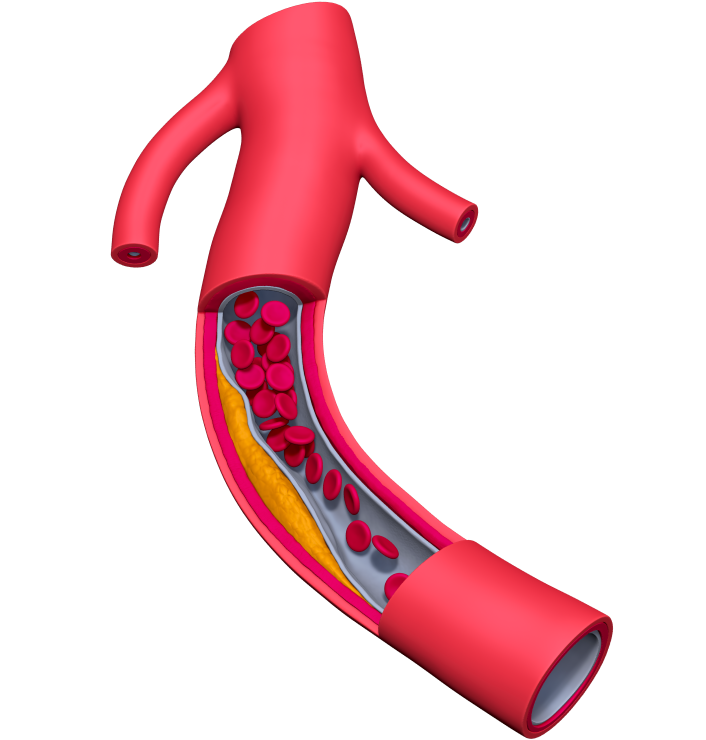
Why is coronary artery disease dangerous?
As plaque builds up in the arteries, it can harden and narrow them (a condition called stenosis). This can reduce blood flow, increasing the risk of chest pain, shortness of breath, heart attacks and potentially life-threatening complications.
It’s often assumed that heart attacks only occur when a blockage is severe or blood flow is reduced (a condition called ischemia). However, more than 75% of plaques leading to heart attacks only cause mild stenosis.5
Research indicates that the presence of high-risk soft heart plaque is the most accurate predictor of fatal heart attacks.6 Soft plaques have an unstable core and are prone to rupturing. When a plaque ruptures, the contents of the plaque spill into the bloodstream, triggering the formation of a blood clot that can block the artery. If the artery becomes completely blocked, it disrupts blood flow and causes a heart attack.

Over 50% of individuals who die or suffer from a heart attack experience no symptoms before the event.7
Know the test: How does Cleerly show coronary artery disease?
Cleerly is a tool that interprets images of the heart and detects plaque in the arteries. It uses advanced machine learning to find indicators of blockages and reduced blood flow to the heart. Before you can have a Cleerly analysis, your healthcare provider will refer you to get a coronary computed tomography angiography, also called a CCTA.
A CCTA is a non-invasive imaging test. Like X-rays, a CCTA produces multiple images or pictures of the inside of the body. Clinical guidelines indicate that CCTA is an accurate method for quantifying and assessing coronary plaque, and it’s widely recommended for evaluating suspected heart disease.8,9,10
Traditionally, clinical readers, such as radiologists, would interpret images manually, but they are not as accurate as AI-based methods for stenosis detection or quantifying how much plaque is present. Cleerly streamlines the process of reading a CCTA and has an accuracy rate superior to most advanced clinical readers.11 Your healthcare provider will always review and approve your Cleerly analysis results before sharing them with you. They will consider these results and results from other available tools, as Cleerly analysis is one of many tools your healthcare provider may use to form a comprehensive diagnosis.

What Cleerly reveals about your heart
Cleerly’s AI-powered CCTA analysis generates a 3D model of your coronary arteries, revealing the important details about your heart health:
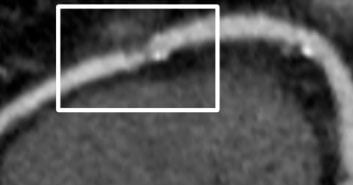 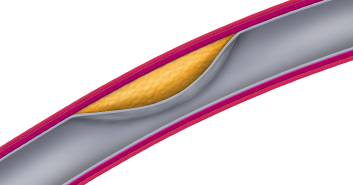
Types of plaque |
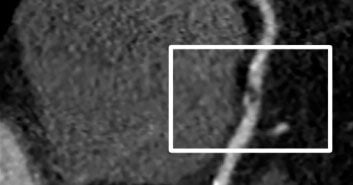 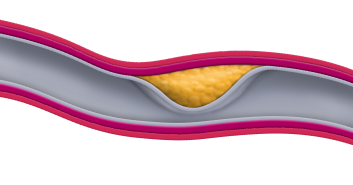
Plaque volume |
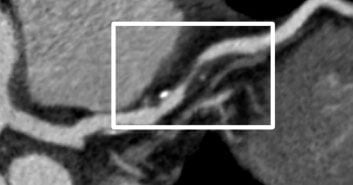 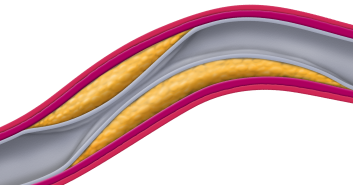
Stenosis (narrowing) |
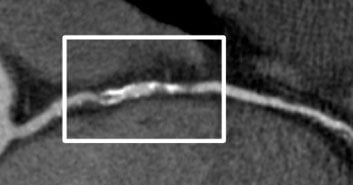 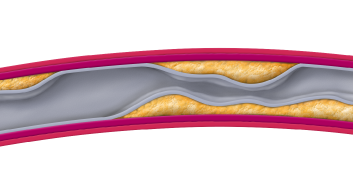
Ischemia (reduced blood flow) |
What your provider sees on your Cleerly report
After your Cleerly scan, your provider can view your results in our software platform. Additionally, they will receive a report containing your results with images of arteries containing plaque, total plaque volume, stenosis (blockages), types of plaque present in the arteries as well as the likelihood of ischemia (reduced blood flow), when requested by your provider.
In the report images, hardened plaque will appear as blue plaque. Yellow plaque is non-hardened plaque and red plaque is high-risk soft plaque. Cleerly will identify the location of the artery for your provider above each image.
Additional terms will be on the report to help your provider determine the severity of your plaque buildup. Ask your provider if you have additional questions about what your Cleerly analysis shows.

How Cleerly is different
Currently, many healthcare providers rely on blood tests, non-invasive diagnostic tests, such as a coronary artery calcium score and stress testing, and family medical history to identify if a person is at risk of heart attack. Unfortunately, these disease detection methods do not truly measure the heart’s current disease state. In fact, 70% of heart attack victims are considered low-risk by these traditional methods of assessing heart disease.17
Cleerly uses machine learning trained on millions of patient images not just to detect plaque, but also quantify its type, volume, and location. This gives healthcare providers a comprehensive view of hardened and soft plaque, blockages, and the likelihood of reduced blood flow. Early detection of significant plaque enables healthcare providers to take proactive measures to prevent potential heart attacks.


How does Cleerly compare to calcium scoring?
Calcium scoring is when providers use coronary CT images to measure hardened plaque, also called calcified plaque, in the arteries to predict heart attack risk. A person’s risk is scored from 0 to greater than 1000, with scores in the higher range indicating more calcified plaque.
A calcium score does not provide a complete picture of a person’s actual state of coronary artery disease. A score of zero means there is no calcified plaque; however, other types of plaque may still be present. These other kinds of plaque can still put a person at risk of heart attack.18
Cleerly is different from calcium scoring because it provides a more comprehensive report that shows all types of plaque build-up and the difference between high and low-risk plaque. Coronary artery calcium scoring remains a useful diagnostic tool for many providers, but it does not replicate the information provided in a Cleerly analysis.
Know the solution: How your healthcare provider uses Cleerly to treat coronary artery disease
Informed, data-driven decisions
Cleerly equips healthcare providers with the detailed insights needed to make informed, data-driven decisions about your heart health. After your Cleerly analysis, your provider will receive a report with a comprehensive view of your heart’s arteries, which they can use to identify your risk and inform treatment plans.
One goal of identifying coronary artery disease is to take action to stabilize high-risk plaque and reduce your risk of a heart attack. Higher-risk, soft plaques can be transformed into hardened, stable plaques with effective medical therapy and lifestyle changes.19
Additionally, your provider can use your Cleerly report to identify if there are significant blockages or reduced blood flow that require immediate intervention. No matter your level of disease, your healthcare provider can use your Cleerly results to help determine the right course of treatment to reduce your long-term risk of heart attack.

Introducing precision heart care
By offering personalized, actionable insights into your heart health, Cleerly supports you and your healthcare provider in making the best decisions for your long-term health. With Cleerly, you can understand your level of disease and how it changes over time. Speak with your provider to learn more about the insights from your Cleerly report.
-
References
- 2024 Heart Disease and Stroke Statistics Update Fact Sheet. American Heart Association website. https://www.heart.org/-/media/PHD-Files-2/Science-News/2/2024-Heart-and-Stroke-Stat-Update/2024-Statistics-At-A-Glance-final_2024.pdf
- Atherosclerosis. ⇱ MedlinePlus. Accessed Jan 10, 2024
- https://www.heart.org/en/health-topics/heart-attack/understand-your-risks-to-prevent-a-heart-attack
- Yusuf S, Hawken S, Ounpuu S et la. Effect of potentially modifiable risk factors associated with myocardial infarction in 52 countries (the INTERHEART study): case-control study. Lancet 2004.
- Chang HJ, Lin FY, Lee SE et al. Coronary Atherosclerotic Precursors of Acute Coronary Syndromes. J Am Coll Cardiol. 2018.
- https://www.ahajournals.org/doi/10.1161/CIRCULATIONAHA.119.044720
- 2010 ACCF/AHA Guideline for Assessment of Cardiovascular Risk in Asymptomatic Adults. ⇱ Circulation. November 2010.
- Recent-onset chest pain of suspected cardiac origin: assessment and diagnosis (2010). National Institute for Health and Care Excellence. https://www.nice.org.uk/guidance/CG95
- Moss AJ et al. The Updated NICE Guidelines: Cardiac CT as the First-Line Test for Coronary Artery Disease. Curr Cardiovasc Imaging Rep. 2017.
- Knuuti J, Wijns W, Saraste A et al. 2019 ESC Guidelines for the diagnosis and management of chronic coronary syndromes. Eur Heart J. 2020.
- Bernardo R, Nurmohamed NS, Bom MJ, Jukema R, de Winter RW, Sprengers R, Stroes ESG, Min JK, Earls J, Danad I, Choi AD, Knaapen P. Diagnostic accuracy in coronary CT angiography analysis: artificial intelligence versus human assessment. Open Heart. 2025 Jan 11;12(1):e003115. doi: 10.1136/openhrt-2024-003115. PMID: 39800437.
- Chang, Hyuk-Jae et al. Coronary Atherosclerotic Precursors of Acute Coronary Syndromes. Journal of the American College of Cardiology vol. 71,22 (2018): 2511-2522. doi:10.1016/j.jacc.2018.02.079
- Nurmohamed, Nick S et al. Atherosclerosis quantification and cardiovascular risk: the ISCHEMIA trial. European heart journal, ehae471. 5 Aug. 2024, doi:10.1093/eurheartj/ehae471
- Hadamitzky M et al. Optimized prognostic score for coronary computed tomographic angiography: results from the CONFIRM registry (COronary CT Angiography EvaluatioN For Clinical Outcomes: An InteRnational Multicenter Registry). J Am Coll Cardiol. 2013.
- Tomaniak M et al. Vulnerable plaques and patients: state-of-the-art. Eur Heart J. 2020.
- Stuijfzand WJ et al. Stress Myocardial Perfusion Imaging vs Coronary Computed Tomographic Angiography for Diagnosis of Invasive Vessel-Specific Coronary Physiology Predictive Modeling Results From the Computed Tomographic Evaluation of Atherosclerotic Determinants of Myocardial Ischemia (CREDENCE) Trial. JAMA Cardiol. 2020 Aug 19.
- Preventing myocardial infarction in the young adult in the first place: how do the national cholesterol education panel iii guidelines perform? ⇱ Journal of the American College of Cardiology. May 2003.
- Lo-Kioeng-Shioe MS, Rijlaarsdam-Hermsen D, van Domburg RT, Hadamitzky M, Lima JAC, Hoeks SE, Deckers JW. Prognostic value of coronary artery calcium score in symptomatic individuals: A meta-analysis of 34,000 subjects. Int J Cardiol. 2020 Jan 15;299:56-62. doi: 10.1016/j.ijcard.2019.06.003. Epub 2019 Jun 4. PMID: 31229262.
- Lee SE et al. Effects of Statins on Coronary Atherosclerotic Plaques: The PARADIGM (Progression of AtheRosclerotic PlAque DetermIned by Computed TomoGraphic Angiography Imaging) Study. J Am Coll Cardiol CV Imaging. 2018.